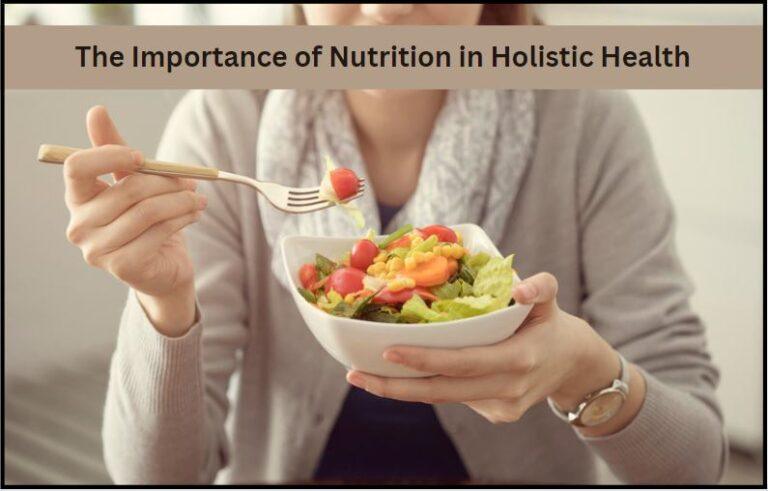A Holistic Approach to Nutrition for Optimal Health
We live in an era where health is pivotal, and wellness is more than just a trend. The concept of holistic nutrition for optimal health has garnered significant attention, and for good reason. People are tired of dieting and starving themselves.
For individuals seeking to thrive in every facet of health – physical, mental, and emotional – embracing holistic nutrition paves the way for authenticity and well-being.
Discover what holistic nutrition entails, the remarkable benefits it can offer, and the actionable steps to integrate it into your daily routine. This guide is for anyone looking to unlock the full potential of their health through a comprehensive nutritional approach.

Understanding Holistic Nutrition: A Wholesome Approach to Health
Holistic nutrition is more than just the nutrients you consume. It’s a philosophy that recognizes the interconnectedness of the body, mind, and spirit. At its core, holistic nutrition takes into account individuality, focusing on personalized lifestyle plans tailored to one’s unique needs.
Instead of isolating symptoms and addressing them as distinct health issues, holistic nutrition aims to treat the person as a whole, considering all aspects of their life that may contribute to their well-being.
The Core Tenets of Holistic Nutrition
- Bio-individuality: Recognizing that each person has their own specific, unique nutritional and dietary needs.
- Whole Foods: Prioritizing the consumption of unprocessed and unrefined foods to nourish the body with essential vitamins, minerals, and nutrients.
- Mindful Eating: Being fully present and aware while consuming food, which fosters a healthy relationship with eating.
- Balance and Moderation: Understanding the importance of a varied diet, enjoying a wide range of foods in moderation.
- Sustainability: Not only sustaining the health of the individual but also that of the planet through mindful food choices.
- Lifestyle Integration: Acknowledging that nutrition is integral to a broader spectrum of well-being, including stress management, sleep, and physical activity.
Benefits of Holistic Nutrition: A Comprehensive Wellness Solution
Engaging in holistic nutrition can yield a wealth of benefits that extend beyond physical health. By nourishing your body with real, whole foods and embracing a mindful approach to eating, you can experience an array of improvements in your well-being.
Physical Health Improvements
Holistic nutrition can lead to better digestion, improved immunity, and the maintenance of a healthy weight. The nourishment of the body with nutrient-dense foods can prevent various chronic diseases, providing a foundation for longevity.
Mental Well-being Enhancement
The foods we eat profoundly affect our brain function and mental health. A holistic approach to nutrition can lead to reduced stress, anxiety, and depression, while enhancing cognitive function and clarity.
Enhanced Energy Levels and Vitality
A diet rich in whole, unprocessed foods can provide sustained energy levels throughout the day, reducing the reliance on stimulants and promoting an overall sense of vitality.
Key Principles of Holistic Nutrition: The Cornerstones of Health
Adhering to the principles of holistic nutrition sets a solid foundation for a nourishing diet and a flourishing life. These pillars are essential for creating personalized plans that support the individual’s unique needs and health goals.
Whole Foods Emphasis
Eating foods in their most natural state, free from additives and processing, ensures that you receive the maximum nutritional benefits. Whole foods such as fruits, vegetables, whole grains, and lean proteins offer a broad spectrum of nutrients that contribute to vibrant health.
Mindful Eating Practices
In a world full of distractions, practicing mindful eating can transform your relationship with food. When you’re present and attentive to your eating experience, you can savor the flavors, become more aware of your body’s hunger and satiety cues, and make more healthful choices.
Individualized Nutrition Plans
Holistic nutrition takes into account personal health history, preferences, and lifestyle factors to create a plan that is realistic and sustainable for the individual. It’s not a one-size-fits-all approach but a bespoke framework that evolves with the individual’s health needs.
Incorporating Holistic Nutrition into Daily Life
Adopting a holistic approach to nutrition doesn’t have to be overwhelming. It’s about making small, sustainable changes that add up to significant improvements in your well-being.
Here’s a detailed list of how to seamlessly integrate holistic nutrition principles into your daily routine:
- Mindful Eating: Practice being present and attentive while eating. Avoid distractions like TV or electronic devices, and savor each bite, paying attention to taste, textures, and how your body responds to the food.
- Balanced Meals: Aim to include a variety of nutrient-dense foods in every meal. This includes lean proteins, healthy fats, complex carbohydrates, and a colorful array of fruits and vegetables.
- Whole Foods: Prioritize whole, unprocessed foods over packaged and refined options. Utilize fresh produce, whole grains, and minimally processed proteins to form the foundation of your meals.
- Meal Planning: Plan your meals ahead of time to ensure you have balanced, nutritious options readily available. Consider batch cooking and meal prepping to save time and reduce reliance on convenience foods.
- Hydration: Stay well-hydrated throughout the day by consuming water, herbal teas, and fresh fruit infusions. Limit sugary drinks and excessive caffeine intake.
- Healthy Snacking: Keep a variety of healthy snacks on hand such as nuts, seeds, fresh fruit, and veggie sticks to satisfy hunger between meals.
- Mindful Grocery Shopping: When shopping, focus on the perimeter of the grocery store where fresh produce, lean proteins, and whole grains are typically found. Read food labels and ingredient lists to make informed choices.
- Nutrient Density: Choose foods that are rich in essential nutrients. For example, opt for leafy greens, berries, nuts, seeds, and fatty fish to maximize your nutrient intake.
- Cooking Methods: Experiment with cooking methods that preserve the nutritional value of foods, such as steaming, roasting, grilling, and sautéing with healthy oils.
- Variety and Color: Embrace a diverse range of fruits and vegetables in different colors to ensure a wide spectrum of vitamins, minerals, and antioxidants.
- Gut Health: Support your gut health by incorporating probiotic-rich foods like yogurt, kefir, sauerkraut, and kimchi into your diet.
- Mindful Indulgence: Allow yourself to enjoy occasional treats or indulgent foods, but strive for balance and moderation in your overall dietary choices.
Wrapping Up: The Holistic Nutrition for Optimal Health Approach
By embracing holistic nutrition, you open the door to a wealth of benefits that extend far beyond the plate. It’s a philosophy that nourishes not just the body, but the mind and spirit as well.
Recap of Holistic Nutrition Benefits
Holistic nutrition can lead to better physical health, enhanced mental well-being, and increased vitality. It’s a sustainable approach to life that can help you achieve your health goals and live your best life.
Encouragement for Incorporating Holistic Practices for Optimal Health
Slowly integrate the principles of holistic nutrition into your life, embracing whole foods, mindful eating, and personalized plans. With patience and dedication, you’ll find that a holistic approach to nutrition can be one of the most rewarding investments in your health.
Start your holistic nutrition journey today and discover the extraordinary benefits of nourishing your entire being. As you honor the interconnectedness of your body, mind, and spirit through food, you’ll pave the way for a vibrant and fulfilling life.






